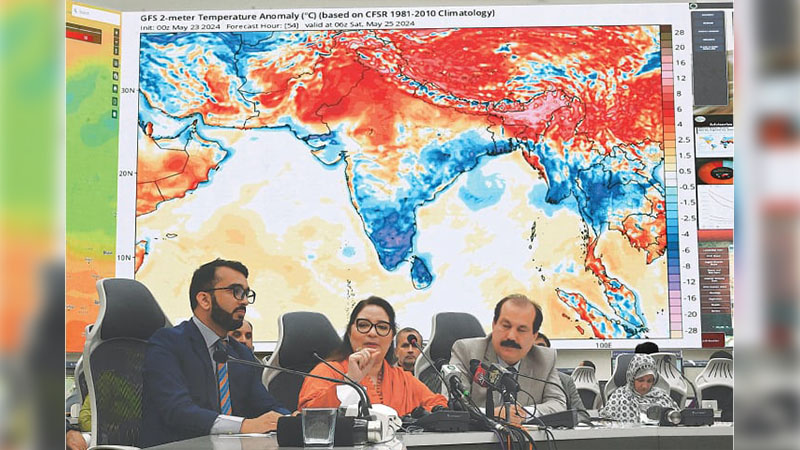As nearly 26 districts across Pakistan endure a relentless heatwave since May 21, the Ministry of Climate Change announced that this first wave is expected to last until May 30. Two additional heatwaves are anticipated in June. The ministry attributes these extreme weather conditions to unsustainable environmental practices and widespread deforestation.
In a press conference alongside senior officials from the National Disaster Management Authority (NDMA), Romina Khurshid Alam, the prime minister’s coordinator on climate change, urged federal and provincial governments to mobilise resources to safeguard citizens, particularly vulnerable groups such as children and the elderly, from the intense heat.
Heatwaves expected to persist
According to data from the Pakistan Meteorological Department, temperatures across several regions are currently 5 to 6 degrees Celsius above average. Alam reported that 26 districts in Punjab, Sindh, and Balochistan are under severe heatwave conditions, which will persist in three phases throughout the summer.
The first phase, from May 22-30, will be followed by a second wave on June 7-8 and a third wave in the last week of June. “This is just the beginning,” Alam warned, highlighting the high atmospheric pressure exacerbating the situation and affecting socio-economic activities.
Government response and preventive measures
Joined by NDMA’s Member for Disaster Risk Reduction, Idrees Mahsud, and technical expert Dr. Tayyab, Alam emphasised the dissemination of comprehensive guidelines and early warnings to prevent casualties, recalling the deadly 2015 heatwave that claimed nearly 2,500 lives.
Alam stressed that human activities, including deforestation and unsustainable environmental practices, are primary drivers of these heatwaves. “Global warming is impacting the entire world, and we are witnessing its effects with these frequent and intense heatwaves,” she stated. Ongoing public awareness campaigns aim to educate people on health risks and preventive measures.
Immediate public health advice
To prevent heatwave casualties, Alam advised the public to limit unnecessary outdoor activities, especially for children, the elderly, and those with health conditions. The NDMA is actively working on early warnings and coordinating with provincial departments to manage natural disasters.
Risks of glacier melt and forest fires
Alam highlighted that the heatwave is accelerating glacier melt and increasing the risk of forest fires. She urged caution in national parks and advised against discarding flammable materials. Precautions such as leaving vehicle windows slightly open to prevent fires and ensuring access to water for workers are recommended.
Long-term climate vulnerability
Dr. Tayyab from the NDMA noted that Pakistan ranks as the fifth most vulnerable country to climate change. The NDMA has developed a disaster calendar projecting natural calamities for the next six months. Recent erratic weather patterns have caused significant rainfall variations, impacting regions like Khyber Pakhtunkhwa and Balochistan. Water stress and the risk of drought are also major concerns during heatwaves, with areas like Tharparkar and Jacobabad already experiencing mild drought conditions.
Coordination and technology for disaster management
In response to media queries, Alam confirmed the formation of a high-level committee by the prime minister to coordinate efforts across relevant authorities. The NDMA’s Mahsud added that a mobile application is being developed to provide real-time alerts, advisories, and disaster management plans to the public and media. The NDMA’s national coordination cell maintains close contact with provincial disaster management authorities and international agencies, ensuring comprehensive disaster preparedness and response.
As Pakistan grapples with these extreme weather conditions, it underscores the urgent need for sustainable environmental practices and robust disaster management to protect its citizens from the growing impacts of climate change.
